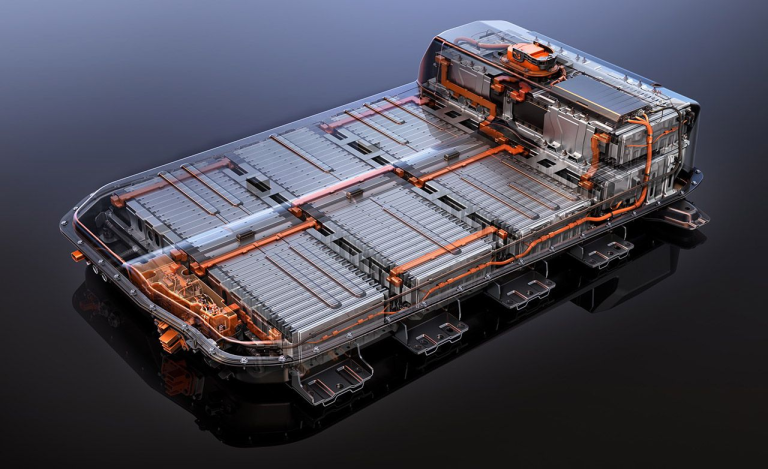Introduction
The automotive industry is undergoing a transformative shift towards sustainability, with hybrid and electric vehicles (EVs) playing a pivotal role in reducing carbon emissions and dependence on fossil fuels. Central to the performance and adoption of these vehicles are lithium-ion batteries, which offer high energy density, efficiency, and long life. This article delves into the significance of lithium-ion batteries in hybrid and electric vehicles, their advantages, challenges, and future trends.

The Rise of Hybrid and Electric Vehicles
Environmental Concerns
Rising environmental concerns and stringent emission regulations are driving the transition from traditional internal combustion engine vehicles to hybrid and electric alternatives. These vehicles contribute significantly to reducing greenhouse gas emissions and improving air quality.
Technological Advancements
Advancements in battery technology, power electronics, and electric drivetrains have made hybrid and electric vehicles more efficient and affordable. Lithium-ion batteries, in particular, have been instrumental in this progress due to their superior performance characteristics.
Market Growth
The global market for hybrid and electric vehicles is expanding rapidly. Governments worldwide are providing incentives, subsidies, and infrastructure investments to promote the adoption of these vehicles, further boosting market growth.
Why Lithium-Ion Batteries?
High Energy Density
Lithium-ion batteries have a high energy density, allowing them to store more energy in a smaller and lighter package compared to other battery types. This is crucial for extending the driving range of hybrid and electric vehicles.
Long Cycle Life
These batteries offer a long cycle life, meaning they can endure numerous charge and discharge cycles without significant degradation. This longevity is essential for the durability and cost-effectiveness of hybrid and electric vehicles.
High Efficiency
Lithium-ion batteries are highly efficient, with minimal energy loss during charging and discharging processes. This efficiency translates to better vehicle performance and longer driving ranges.
Fast Charging
Lithium-ion batteries support fast charging, reducing the time needed to recharge the vehicle. This convenience is vital for enhancing the practicality and user acceptance of hybrid and electric vehicles.
Applications in Hybrid and Electric Vehicles
Hybrid Electric Vehicles (HEVs)
In hybrid electric vehicles, lithium-ion batteries work alongside internal combustion engines to improve fuel efficiency and reduce emissions. These batteries store energy generated during braking and coasting, which is then used to assist the engine during acceleration.
Plug-In Hybrid Electric Vehicles (PHEVs)
Plug-in hybrid electric vehicles have larger lithium-ion batteries that can be recharged from an external power source. This allows for extended electric-only driving ranges, reducing fuel consumption and emissions even further.
Battery Electric Vehicles (BEVs)
Battery electric vehicles rely entirely on lithium-ion batteries for power. These vehicles offer zero emissions and are becoming increasingly popular as battery technology improves and charging infrastructure expands.
Advantages of Lithium-Ion Batteries in Hybrid and Electric Vehicles
Lightweight and Compact
The lightweight and compact nature of lithium-ion batteries contributes to overall vehicle efficiency and performance. Reducing the weight of the battery pack allows for better handling and acceleration.
High Power Output
Lithium-ion batteries can deliver high power output, which is essential for the performance and acceleration of electric vehicles. This capability ensures that EVs can compete with traditional vehicles in terms of driving experience.
Low Self-Discharge
Lithium-ion batteries have a low self-discharge rate, meaning they retain their charge for longer periods when not in use. This is particularly beneficial for vehicles that may be parked for extended periods.
Enhanced Safety Features
Modern lithium-ion batteries are equipped with advanced safety features, such as thermal management systems and protective circuitry, to prevent overheating, short circuits, and other potential hazards.
Challenges of Lithium-Ion Batteries in Hybrid and Electric Vehicles
Cost
Lithium-ion batteries are relatively expensive compared to other battery technologies. The high cost can be a barrier to the widespread adoption of hybrid and electric vehicles, although prices have been decreasing over time due to advancements in manufacturing and economies of scale.
Limited Raw Material Supply
The production of lithium-ion batteries relies on raw materials such as lithium, cobalt, and nickel. Limited supply and geopolitical issues can impact the availability and cost of these materials, posing challenges for the battery industry.
Thermal Management
Managing the temperature of lithium-ion batteries is crucial for their safety and longevity. Overheating can lead to thermal runaway, which poses safety risks. Effective thermal management systems are essential to mitigate these risks.
Future Trends
Solid-State Batteries
Solid-state batteries, which use a solid electrolyte instead of a liquid one, are seen as the next big advancement in battery technology. They promise higher energy densities, faster charging times, and improved safety compared to traditional lithium-ion batteries.
Second-Life Applications
As lithium-ion batteries reach the end of their useful life in vehicles, they can be repurposed for secondary applications such as stationary energy storage. This approach maximizes the value extracted from the batteries and supports sustainability.
Recycling and Sustainability
Improving recycling processes for lithium-ion batteries is crucial for reducing environmental impact and ensuring the sustainable supply of raw materials. Advances in recycling technology are expected to enhance the efficiency and economics of battery recycling.
Integration with Renewable Energy
The integration of lithium-ion batteries with renewable energy sources, such as solar and wind, can enhance the sustainability of hybrid and electric vehicles. By using renewable energy to charge the batteries, the overall environmental impact of these vehicles can be further reduced.
Conclusion
Lithium-ion batteries are at the heart of the hybrid and electric vehicle revolution, offering high energy density, efficiency, and reliability. Their role in extending driving ranges, enabling fast charging, and ensuring vehicle performance is indispensable. While challenges such as cost, raw material supply, and thermal management exist, ongoing advancements and innovations are expected to overcome these hurdles. As the world moves towards a more sustainable future, lithium-ion batteries will continue to play a crucial role in powering the next generation of hybrid and electric vehicles, driving us closer to a cleaner and greener transportation landscape.

